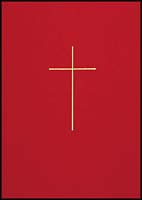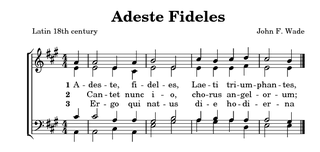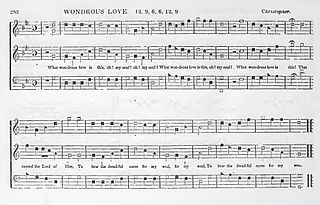
A hymn is a type of song, and partially synonymous with devotional song, specifically written for the purpose of adoration or prayer, and typically addressed to a deity or deities, or to a prominent figure or personification. The word hymn derives from Greek ὕμνος (hymnos), which means "a song of praise". A writer of hymns is known as a hymnist. The singing or composition of hymns is called hymnody. Collections of hymns are known as hymnals or hymn books. Hymns may or may not include instrumental accompaniment. Polyhymnia is the Greco/Roman goddess of hymns.

A hymnal or hymnary is a collection of hymns, usually in the form of a book, called a hymnbook. They are used in congregational singing. A hymnal may contain only hymn texts ; written melodies are extra, and more recently harmony parts have also been provided.

"Love Divine, All Loves Excelling" is a Christian hymn by Charles Wesley, first published in 1747. It was initially published as part of his Hymns for Those that Seek and Find and quickly became a central hymn in both Methodist and wider Christian worship. The hymn reflects Wesley's teachings on Christian perfection, expressing a longing for God's transforming and sanctifying grace.
Decisions concerning the conduct of public worship in the Church of Scotland are entirely at the discretion of the parish minister. As a result, a wide variety of musical resources are used. However, at various times in its history, the General Assembly has commissioned volumes of psalms and hymns for use by congregations.

The Genevan Psalter, also known as the Huguenot Psalter, is a 1539 metrical psalter in French created under the supervision of John Calvin for liturgical use by the Reformed churches of the city of Geneva in the sixteenth century.
The New Century Hymnal is a comprehensive hymnal and worship book published in 1995 for the United Church of Christ. The hymnal contains a wide-variety of traditional Christian hymns and worship songs, many contemporary hymns and songs, and a substantial selection of "world music" selections origin, a full lectionary-based Psalter, service music selections, and a selection of liturgies from the UCC Book of Worship (1986). Generally speaking, the hymnal is theologically within the mainline Protestant tradition, with a slant toward liturgical forms.

The Lutheran Hymnal (TLH) is a hymnal first published in 1941 by Concordia Publishing House in St. Louis, Missouri, for the Evangelical Lutheran Synodical Conference of North America. Its development had been started by the conference's largest member, the Lutheran Church – Missouri Synod (LCMS), as a replacement for that denomination's first official English-language hymnal, the 1912 Evangelical Lutheran Hymn-Book. In 1969 the LCMS published the Worship Supplement containing additional hymns and service music.

Evangelical Lutheran Worship (ELW) is the current primary liturgical and worship guidebook and hymnal for use in the Evangelical Lutheran Church in America (ELCA) and the Evangelical Lutheran Church in Canada (ELCIC). It was first published in October 2006 by the ELCA's publishing house, Augsburg Fortress. The new worship resource replaced its predecessor of 28 years before, the Lutheran Book of Worship (LBW) of 1978, and that hymnal's supplements: Hymnal Supplement 1991, published by GIA Publications, a Roman Catholic publishing house, and With One Voice (WOV), published by Augsburg Fortress in 1995.

A hymn tune is the melody of a musical composition to which a hymn text is sung. Musically speaking, a hymn is generally understood to have four-part harmony, a fast harmonic rhythm, with or without refrain or chorus.

"Lord of all Hopefulness" is a Christian hymn written by English writer Jan Struther, which was published in the enlarged edition of Songs of Praise in 1931. The hymn is used in liturgy, at weddings and at the beginning of funeral services, and is one of the most popular hymns in the United Kingdom.

A liturgical book, or service book, is a book published by the authority of a church body that contains the text and directions for the liturgy of its official religious services.

Lutheran Worship (LW) is one of the official hymnals of The Lutheran Church–Missouri Synod (LCMS). Published in 1982 by Concordia Publishing House in St. Louis, Missouri, it is the denomination's third English-language hymnal and was intended to replace The Lutheran Hymnal (TLH). Additional hymns and service music are contained in the companion, Hymnal Supplement 98.
Singing the Faith is the current authorised hymnbook of the Methodist Church of Great Britain, first published in 2011.

"What Wondrous Love Is This" is a Christian folk hymn from the American South. Its text was first published in 1811, during the Second Great Awakening, and its melody derived from a popular English ballad. Today it is a widely known hymn included in hymnals of many Christian denominations.
Ruth Carolyn Duck was an ordained pastor in the United Church of Christ, a liturgical theologian and professor of worship who taught for 27 years at Garrett-Evangelical Theological Seminary in Evanston, Illinois. Duck was best known for her work as a composer, writer and adaptor of hymns. In 1973, she was part of the committee at the Ecumenical Women's Center of Chicago that produced Because We Are One People, the first 20th century collection of original and adapted hymns that promoted the use of “non-sexist language”. Duck wrote over 150 hymns, edited three books of sources for worship services and wrote on the topic of Trinitarian theology, all with an eye toward facilitating the use of gender inclusive language in the context of Christian worship. She was a leading champion for and developer of inclusive language worship sources.
Hymnody in continental Europe developed from early liturgical music, especially Gregorian chant. Music became more complicated as embellishments and variations were added, along with influences from secular music. Although vernacular leisen and vernacular or mixed-language carols were sung in the Middle Ages, more vernacular hymnody emerged during the Protestant Reformation, although ecclesiastical Latin continued to be used after the Reformation. Since then, developments have shifted between isorhythmic, homorhythmic, and more rounded musical forms with some lilting. Theological underpinnings influenced the narrative point of view used, with Pietism especially encouraging the use of the first person singular. In the last several centuries, many songs from Evangelicalism have been translated from English into German.
Church music during the Reformation developed during the Protestant Reformation in two schools of thought, the regulative and normative principles of worship, based on reformers John Calvin and Martin Luther. They derived their concepts in response to the Catholic church music, which they found distracting and too ornate. Both principles also pursued use of the native tongue, either alongside or in place of liturgical Latin.

The 1979 Book of Common Prayer is the official primary liturgical book of the U.S.-based Episcopal Church. An edition in the same tradition as other versions of the Book of Common Prayer used by the churches within the Anglican Communion and Anglicanism generally, it contains both the forms of the Eucharistic liturgy and the Daily Office, as well as additional public liturgies and personal devotions. It is the fourth major revision of the Book of Common Prayer adopted by the Episcopal Church, and succeeded the 1928 edition. The 1979 Book of Common Prayer has been translated into multiple languages and is considered a representative production of the 20th-century Liturgical Movement.
Elizabeth Joyce Smith is an Australian Anglican priest and hymnist. She has published three collections of hymns, and several of her hymns have been included in the ecumenical hymnal Together in Song. Ordained a deacon in the Anglican Church in Australia in 1987, Smith became a priest in 1993. She earned a PhD from the Pacific School of Religion, where she focused on feminist hermeneutics and liturgical studies. Her doctoral thesis was published in 1999, with the title Bearing Fruit in Due Season: Feminist Hermeneutics and the Bible in Worship. She has served on the Liturgy Commission for the Anglican Church of Australia since 1997. In 2018, she was commissioned to write a hymn for the installation of Archbishop Kay Goldsworthy. In 2020, she was appointed a Member of the Order of Australia for her contributions to liturgical scholarship and to the Anglican Church of Australia.











